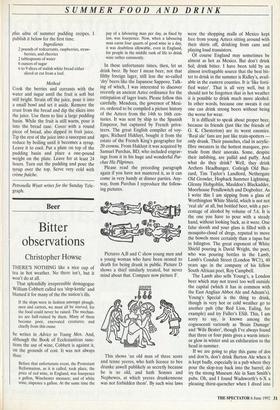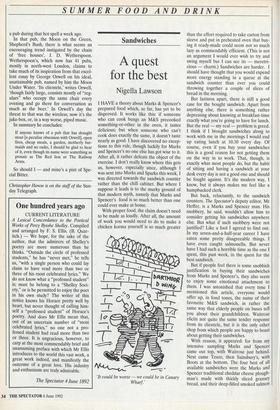Beer
Bitter observations
Christopher Howse
THERE'S NOTHING like a nice cup of tea in hot weather. No there isn't, but it won't do at all.
That splendidly irrepressible demagogue William Cobbett called tea 'slop-kettle' and blamed it for many of the the nation's ills.
If the slops were in fashion amongst plough- men and carters, we must all be starved, for. the food could never be raised. The mechan- ics are half-ruined by them. Many of them become poor, enervated creatures; and chiefly from this cause
he writes in Advice to Young Men. And, although the Book of Ecclesiasticus sanc- tions the use of wine, Cobbett is against it, on the grounds of cost. It was not always thus:
Before that unfortunate event, the Protestant Reformation, as it is called, took place, the price of red wine, in England, was fourpence a gallon, Winchester measure; and of white wine, sixpence a gallon. At the same time the pay of a labouring man per day, as fixed by law, was fourpence. Now, when a labouring man earns four quarts of good wine in a day, it was doubtless allowable, even in England, for people in the middle rank of life to drink wine rather commonly.
In these unfortunate times, then, let us drink beer. By beer I mean beer, not that filthy foreign lager, still less the so-called `dry' beers like the Japanese Sapporo. Talk- ing of which, I was interested to discover recently an ancient Aztec ordinance for the extirpation of lager louts. Please follow this carefully. Mendoza, the governor of Mexi- co, ordered to be compiled a picture history of the Aztecs from the 14th to 16th cen- turies. It was sent by ship to the Spanish Emperor, but captured by French priva- teers. The great English compiler of voy- ages, Richard Hakluyt, bought it from the estate of the French King's geographer for 20 crowns. From Hakluyt it was acquired by Samuel Purchas, BD, who included engrav- ings from it in his huge and wonderful Pur- chas His Pilgrimes.
Please read the preceding paragraph again if you have not mastered it, as it can come in very handy at dinner parties. Any- way, from Purchas I reproduce the follow- ing pictures.
Pictures A,B and C show young men and a young woman who have been stoned to death for being drunk in public. Picture D shows a thief similarly treated, but never mind about that. Compare now picture F.
This shows 'an old man of three score and tenne yeeres, who hath licence to bee drunke aswell publikely as secretly because he is so old, and hath Sonnes and Nephewes, at which yeeres drunkennesse was not forbidden them'. By such wise laws were the shopping malls of Mexico kept free from young Aztecs sitting around with their shirts off, drinking from cans and playing loud transistors.
Of course England may sometimes be almost as hot as Mexico. But don't drink Sol; drink bitter. I have been told by an almost irrefragable source that the best bit- ter to drink in the summer is Ridley's, avail- able in the eastern counties. It is 'like forti- fied water'. That is all very well, but it should not be forgotten that in hot weather it is possible to drink much more alcohol. In other words, because one sweats it out one can drink strong beers without being the worse for wear.
It is difficult to speak about proper beer, because its friends (just like the friends of G. K. Chesterton) are its worst enemies.
`Real ale' fans are just like train-spotters only drunk. Their paunches, clad in acrylic- fibre sweaters in the hottest marquee, pro- trude from their anoraks. Some, despite their imbibing, are pallid and puffy. And what do they drink? Well, they drink Archers Headbanger, Cotleigh Old Buz- zard, Tim Taylor's Landlord, Nethergate Old Growler, Hopback Summer Lightning,
Glenny Hobgoblin, Mauldon's Blackadder, Moorhouse Pendlewitch and Dogbolter. As
I write this I am sipping from a glass of Worthington White Shield, which is not not `real ale' at all, but bottled beer, with a per- centage of alcohol by volume of 5.6. It is the one you have to pour with a steady hand, without looking back, as it were. One false sloosh and your glass is filled with a mosquito-cloud of dregs, reputed to move the bowels more certainly than a tapas bar in Islington. The great exponent of White Shield pouring is David Wright, the poet, who was pouring bottles in the Lamb, Lamb's Conduit Street (London WC1), 40 years ago in the company of his fellow South African poet, Roy Campbell.
The Lamb also sells Young's, a London beer which may not travel too well outside the capital (which it has in common with the East Anglian Abbot Ale and Adnam's). Young's Special is the thing to drink, though in very hot or cold weather go to another pub (the Red Lion, Ealing, for example) and try Fuller's ESB. This, I am sorry to say, is known among the cognoscenti variously as 'Brain Damage' and 'Wife Beater', though I've always found that three or four pints gives a warm interi- or glow in winter and an exhilaration to the head in summer.
If we are going to play this game of dos and don'ts, don't drink Burton Ale when it is kept badly, especially in a pub where they pour the slop-tray back into the barrel; do try the strong Museum Ale in Sam Smith's pubs. Oh, and I found Wadsworth's 6-X a pleasing thirst-quencher when I dived into
SUMMER FOOD AND DRINK
a pub during that hot spell a week ago.
In that pub, the Moon on the Green, Shepherd's Bush, there is what seems an encouraging trend instigated by the chain of 'free houses', J. D. Wetherspoon. Wetherspoon's, which now has 41 pubs, mostly in north-west London, claims to take much of its inspiration from that excel- lent essay by George Orwell on his ideal, unattainable pub, named by him the Moon Under Water. 'Its clientele,' writes Orwell, 'though fairly large, consists mostly of "reg- ulars" who occupy the same chair every evening and go there for conversation as much as the beer.' In Orwell's day the threat to that was the wireless; now it's the juke-box, or, in a way worse, piped music.
In summary he concludes:
If anyone knows of a pub that has draught stout [a peculiar obsession with Orwell], open fires, cheap meals, a garden, motherly bar- maids and no radio, I should be glad to hear of it, even though its name were something as prosaic as The Red lion or The Railway Arms.
So should I — and mine's a pint of Spe- cial Bitter.
Christopher Howse is on the staff of the Sun- day Telegraph.



































































 Previous page
Previous page